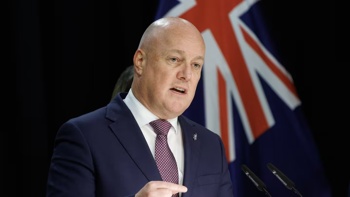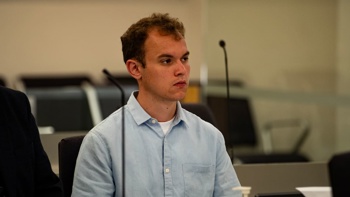- The Royal Commission of Inquiry into Covid-19 has released its first phase report
- It found some vaccine requirements “caused harm” and affected public trust
- The 2021 Auckland lockdown had significant impacts on people’s mental health
The report from the first phase of the Royal Commission of Inquiry into the Covid-19 response has been released, finding that some vaccine requirements were “applied too broadly and remained in place for too long”.
This “caused harm to individuals and families and contributed to loss of social capital” and the consequent loss of trust may have hurt the ability to respond to future pandemics, the inquiry said.
Included among the key findings of the report was that the “use of compulsion” – including mandating various public health measures – was one of the “most controversial aspects” of the Covid-19 response.
This included the decision to put requirements around vaccines, described in the report as a “major source of tension and social division”, with “strongly held views both for and against their use”.
It said that based on the information available in 2021, it was “reasonable” for the Government to issue orders mandating vaccines for specific occupations, such as for border and health workers. The vaccine pass system designed in late 2021, when Delta was the dominant variant, was also described as “reasonable”.
But some vaccine requirements were “applied more broadly than originally envisaged” and the case for them became weaker in 2022 once Omicron became the dominant variant.
“The case for vaccine requirements of all kinds weakened in early 2022 with the arrival of the Omicron variant, since vaccination was now much less effective in preventing Covid-19 transmission and immunity waned over time.
“While beneficial to the individual concerned, vaccination now offered less protection to others and the public health case for requiring it was weak.
“In our view, some workplace, occupational and other vaccine requirements were applied too broadly and remained in place for too long, which caused harm to individuals and families and contributed to loss of social capital.”
This led to social and economic consequences, “reduced trust in Government” and also contributed to “lower uptake of other vaccines”.
“In hindsight, vaccine mandates had substantial, long-lasting impacts that would need to be taken into account in any future decisions around their use in a pandemic response.”
This may make future pandemic responses more difficult, the inquiry said.
“The occupation of Parliament grounds in protest against a range of matters, including mandatory measures (especially vaccine requirements), represented the most significant civil unrest in Aotearoa New Zealand for some time. It is likely to have far-reaching social consequences.”

Photo by Mark Mitchell: Prime Minister Jacinda Ardern and director-general of health Dr Ashley Bloomfield arriving before announcing the country will remain in the red traffic light setting during the post-Cabinet press conference at Parliament, Wellington. 04 April, 2022. NZ Herald photograph by Mark Mitchell
The inquiry found testing, contact tracking and masking requirements were “reasonable” but there were practical issues with their implementation which could be improved for future pandemic responses.
Misinformation and Ardern’s ‘single source of truth’
The inquiry found misinformation and disinformation related to the virus became a challenge over the course of the Covid-19 pandemic.
This, alongside “disaffection” among some over the introduction of vaccine mandates” which culminated in the occupation of Parliament’s grounds in 2022, the inquiry said.
It described this event – which lasted more than three weeks and concluded with a fiery riot in front of the Beehive – as “perhaps the most visible expression of the pandemic’s impacts on social cohesion and trust”.
“The Chief Human Rights Commissioner viewed the decision by senior ministers and officials not to engage directly with the protestors as detrimental.
“Meanwhile, from the second half of 2021 at least, some senior ministers were aware of the pandemic’s increasing impact on ‘social licence’, especially the use of extended lockdowns in Auckland, but did not feel that there were viable alternatives at that time.”
The report also highlighted then-Prime Minister Jacinda Ardern’s “single source of truth” comment as being highlighted by submitters as “unhelpful”.
The authors said she made this remark to “emphasise that the information being conveyed from the government could be relied upon by the public” and an “attempt to tackle misinformation and disinformation.
“However, the phrase was frequently quoted in submissions as something that contributed to a sense of mistrust,” the report said.
Overall, the damage to social cohesion and spread of misinformation and disinformation impacted the public health response, the inquiry said.
It highlighted that the Ombudsman had suggested “increased transparency and oversight by independent integrity bodies may help take some of the ‘sting’ out of public disaffection at times of emergency powers in future”.
Lockdowns
On lockdowns, the inquiry found that alongside tight border restrictions they proved to be “an effective tool” for achieving the country’s elimination strategy of coronavirus in 2020 and early 2021. They were, “at least initially”, supported by high levels of trust and social cohesion as well as clear communication.
Decisions about when to introduce lockdowns or stand them down were “extremely challenging”, the inquiry said, and required “difficult trade-offs in the face of uncertainty”.
It acknowledged that the lockdown in Auckland in late 2021 was viewed as going on for too long by both members of the public and “some senior ministers”.
“Our assessment is that the Government’s decision-making on when to end the final Auckland lockdown reflected its judgment that allowing more time for Māori and Pacific communities to reach higher levels of vaccination was justified by the benefits they would gain, in the form of greater protection against the severe impacts of Covid-19.”
But the inquiry authors were of the view that other factors, like waning protection and assessments of likely resurgence, could have been considered as well, alongside vaccine coverage.
“For example, we note that lockdowns in the Australian states of Victoria and New South Wales ended earlier and at lower vaccination coverage levels than that at which the Auckland lockdown was relaxed, without any associated increase in case numbers. In a future pandemic we think these considerations should also be included in advice to decision-makers.”

Decisions around when to implement lockdowns were "extremely challenging". NZ Herald Photo by Alex Burton 10 October 2021
The repeated lockdowns in Auckland had “cumulative and multifaceted” impacts, ranging from economic to effects on physical and mental health.
Regional boundaries and an essential worker framework were “valuable” but “hard to implement rapidly” with no prior preparation done for such a situation.
“These timing and preparedness issues caused many challenges for businesses, communities and Government.”
Groups found to have been disproportionately impacted by lockdowns included Māori and Pasifika students, those from lower socio-economic backgrounds, and students in Auckland.
However, the inquiry found that efforts by iwi, Māori and other communities “alleviated some potential negative impacts” of the lockdowns. It said they stepped up to “provide essential local leadership, support each other and address local needs”.
“Their pre-existing relationships within their local communities (and, in some cases, with Government) were invaluable in enabling this to happen.”
If New Zealand had better preparation and investment, it would have been less reliant on using lockdowns to eliminate Covid-19, the inquiry said.
“Decision-makers’ options were initially limited by the capacity and effectiveness of the tools available (such as contact tracing) and how effectively measures such as mask-wearing were taken up by the population.
“We note that some Pacific countries (such as Samoa, Tonga and Tokelau) avoided the need for lockdown measures altogether by closing their borders before any Covid-19 cases had occurred, suggesting Aotearoa New Zealand could benefit from earlier border restrictions (in other words, adopting an exclusion strategy) in a future pandemic if the pathogen is particularly infectious and virulent.”
Recommendations
The inquiry presents a long list of lessons to be learnt from the response as well as a large number of recommendations for the Government to now consider.
The report includes 39 key recommendations to “give practical effect to lessons learned from the Covid-19 pandemic”, but the authors acknowledge the next pandemic will come with its own characteristics.
“We cannot predict whether the next pandemic will be triggered by a virus known to us or by an entirely new pathogen, whether it will be more deadly than Covid-19 or less, or whether it will be short-lived or protracted. What we can do is be ready for a range of possible pandemic scenarios.”
Among the recommendations is to establish a central agency to co-ordinate all preparation and response planning for future pandemics, ensure there is an all-of-government response plan, develop plans for the use of lockdowns and border restrictions, and identify circumstances in which vaccine mandates may be recommended.
Brooke van Velden, the Internal Affairs Minister who received the report on Thursday, welcomed it.
“The delivery of the phase one report marks the conclusion of phase one of the Inquiry. Phase one commissioners Professor Tony Blakely and John Whitehead have now resigned from their roles” said van Velden.
“In June I announced there would be a second phase of the inquiry into Covid-19, covering outstanding matters of public concern including vaccine mandates and safety as well as the impact on social and economic disruption.”
The head of the inquiry, epidemiologist Professor Tony Blakely, said on Wednesday that vaccine mandates caused huge pain to a “substantial minority” during the pandemic and Government should consider whether their benefits outweighed their harms.
He said that while the mandates during the later stages of the pandemic were supported by most New Zealanders, the damage to social cohesion needed to be considered when planning for future outbreaks.
It wasn’t clear until Thursday afternoon whether the report would be released today, with the minister previously saying she wouldn’t release it until the second phase was under way.
The full report released on Thursday can be found here.
Take your Radio, Podcasts and Music with you









